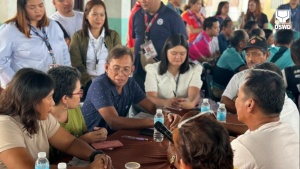
The Department of Social Welfare and Development (DSWD) expressed its gratitude to the community volunteers and stakeholders who participated in the 3rd Implementation Support Mission (ISM) for the Philippine Multi-Sectoral Nutrition Project (PMNP) held in the towns of Lupi and San Fernando in Camarines Sur last January.
“The PMNP contributes to poverty reduction by addressing the nutritional challenges of poor communities, and we are grateful to our partners, the Department of Health (DOH), the World Bank, and our community volunteers and local partners for their participation to continuously enhance the PMNP’s implementation,” DSWD Assistant Secretary Romel Lopez, who is also the agency’s spokesperson, said on Monday (February 5).
The PMNP is co-implemented by the DSWD under the Kapit-bisig Laban sa Kahirapan Comprehensive and Integrated Delivery of Social Services (KALAHI-CIDSS) through the adoption of the Community-Driven Development (CDD) approach which aims to empower poor communities nationwide.
“The significance of the CDD approach is that it engages community members in identifying and prioritizing local challenges, allowing them to design, implement, and manage solutions tailored to their unique needs. By applying this approach in the program design of the PMNP, the DSWD was able to utilize a comprehensive package of interventions, focusing on key behaviors and practices proven to reduce stunting in targeted localities,” Asst. Sec. Lopez explained.
The DSWD spokesperson said the ISM provided a platform for stakeholders to review the overall implementation of the PMNP in five pivotal milestones: Social Development Process, Procurement, Finance, and Environmental and Social Safeguards, as well as Monitoring and Evaluation.
The activity also encouraged the exchange of ideas and best practices on project activities while identifying and addressing critical gaps in the ongoing initiatives, according to the DSWD official.
During the review period, a notable observation underscored the significance of maintaining meticulous records of PMNP procurement activities, underscoring a strong commitment to accountability and transparency.
Additionally, community volunteers in the municipality showcased their proficiency in explaining PMNP procurement procedures, earning solid support from Municipal/Barangay Local Government Units (M/BLGUs).
As part of the transparency mechanism, the KALAHI-CIDSS maintains its Grievance Redress System as the designated platform for addressing concerns about the program, encompassing all its modalities, including the PMNP.
The World Bank, a DSWD development partner, commended the agency’s grievance capture rate under its existing redress mechanism by KALAHI-CIDSS.
The DSWD pledges to work closely with the DOH, its co-implementer in the project, and other partners to formulate strategies that enhance food and nutrition security while tackling poverty-related issues. #


